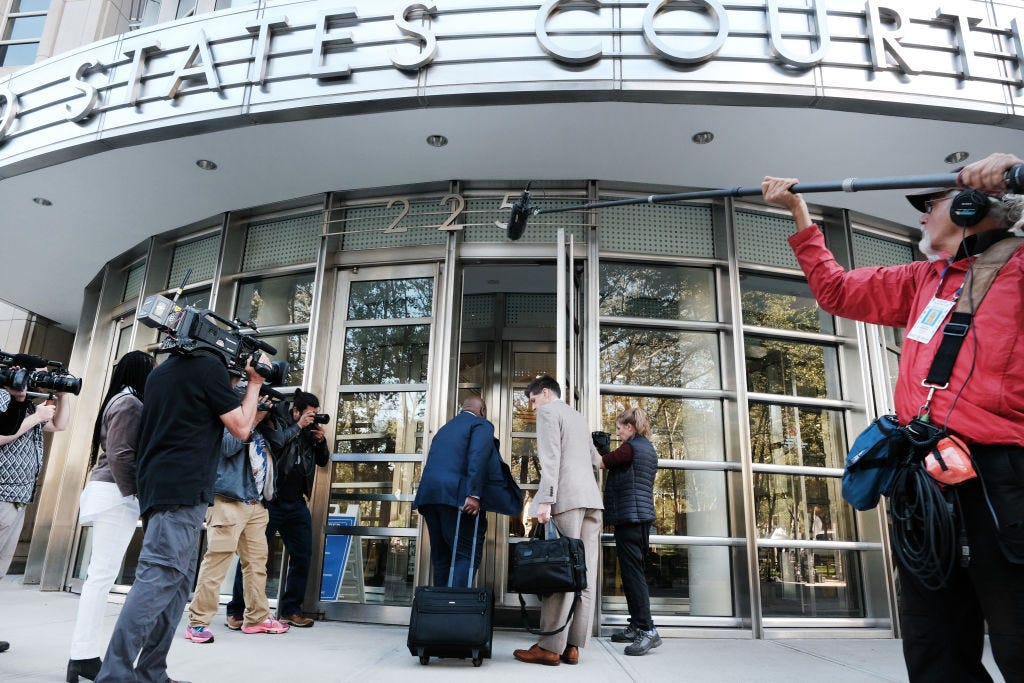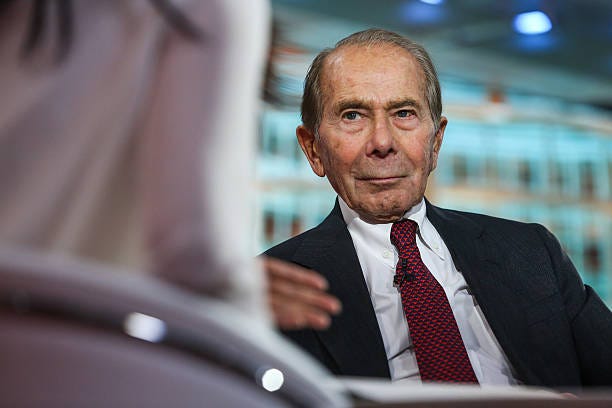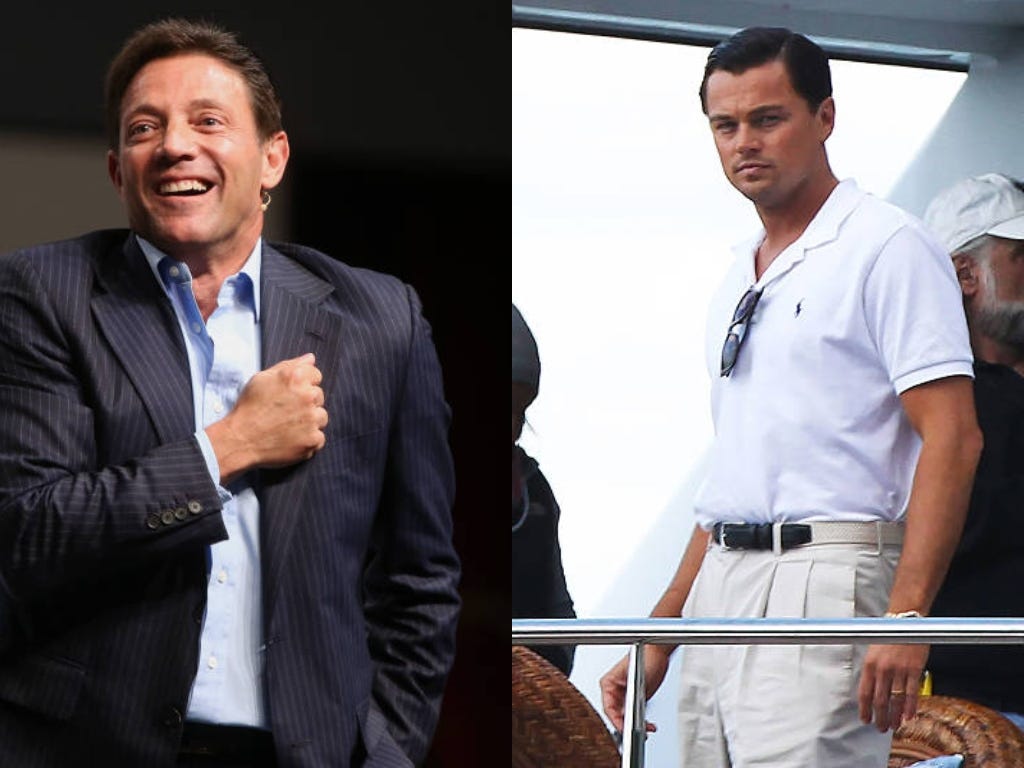Chapter 1, Part 4: Shiny objects (text only)
Chapter 1, Part 4 of my serialized memoir, SMIRK, about my relationship with Martin Shkreli. Here is where it all really started.
The very first time I heard the name “Martin Shkreli,” it was mispronounced: “Shuh-KREL-EE,” a source told me over the phone. (It’s actually “Shhhkrel-EE.”) This, I was told, was the name of a young hedge fund and pharmaceutical company founder who was known for loudly trashing companies online while shorting their stocks. He was also a target of a criminal fraud investigation, but that news hadn’t been publicized. I was being given this scrap of information as a scoop.
The conversation didn’t seem terribly momentous then, although I was grateful to get the tip. It happened around early November 2014, when I was still trying to find my footing as a legal reporter for Bloomberg. My beat was the federal court in Brooklyn, but the important financial cases my editors were most interested in always seemed to be happening elsewhere. I had been sent for a week to Washington D.C. to help cover one of those cases: a grudge match between former AIG CEO and Chairman Maurice R. “Hank” Greenberg and the federal government.
That was a month or so after my honeymoon; I had gotten married to a financial analyst working for a big asset management firm that September. Our wedding, held at Brooklyn Botanic Garden, was lavish and embarrassingly expensive. We paid for it ourselves, with him shouldering the bigger portion. As a newlywed, I should have been happy, but tensions in our one-bedroom Park Slope, Brooklyn apartment had risen after the excitement surrounding the marriage and our honeymoon in Iceland and London had worn off. Truthfully, I hadn’t minded when my editors asked me to hop on the Acela.
A 90-something-year-old withered bean of a man, Greenberg seemed to derive his longevity mostly from spite. During the financial crisis in 2008, U.S. officials pumped $180 billion in taxpayer money into his insurance conglomerate. Americans were largely appalled at the bailout, which seemed engineered to benefit only the wealthy. Greenberg was also unhappy with the bailout, but for a different reason: He thought it should have been bigger, which was why he was suing the feds.
Although many members of the public thought he was a greedy asshole, Greenberg didn’t care, and he was respected by enough rich and powerful people that it didn’t matter. A judge rejected the government’s requests to throw out the case, and let Greenberg take his shots. The erstwhile tycoon hired a rock star lawyer, David Boies, drew up a witness list that included every major character from Andrew Ross Sorkin’s “Too Big to Fail,” and plowed forward with a trial.
After a long day of watching people like Ben Bernanke and Hank Paulson testify about collapsing credit default swap portfolios, and madly scrawling notes by hand (no tape recorders are allowed in federal courts), I was back at Bloomberg’s D.C. bureau when the source gave me a call. To help me understand more about this Shkreli person, the source pointed me in the direction of a BusinessWeek profile that had been written a few months earlier.
“Once a Notorious Short Seller, Martin Shkreli Now Sees a Future in Biotech,” the headline said. The story went on to describe the young multimillionaire as fidgety and eccentric — “Martin Shkreli never sits still,” it began — intelligent, troublemaking (he had already sparked at least two past dust-ups with regulators), and having working class roots.
His knowledge of pharmaceuticals appeared to be deep enough that he impressed investors and credentialed researchers, including one quoted extensively in the piece. It was also apparently accumulated completely by self-study. His formal education ended with an undergraduate business degree from Baruch, a city college. Judging by the comments from him in the article, he appeared to be simultaneously cocky and self-deprecating.
“I hit this field like a tornado,” he bragged in one part of the piece. Later on, he referenced how he used to “sleep on the floor” of his office sometimes. ”I didn’t brush my teeth as often as I should have,” he added. “I think my hygiene has improved quite a bit.”
A flicker of recognition lit up my brain. I knew this type of person. The modest upbringing, the autodidacticism, the in-your-face attitude and relentless striving — it all fit a pattern I had seen before. This was a “Good Will Hunting” of sorts, someone whose brains got him into places where the rest of him didn’t belong. I suspected he was the kind of person who would always be an outsider, no matter how successful he was or how much money he made, and that, in of itself, intrigued me.
But to my editors, he was small potatoes. The response when I explained the tip I had received was a shrug. “Sure, maybe we will run something, if you can get it confirmed,” was more or less the reply, without much enthusiasm. Bloomberg, provider of the orange-and-black screened terminals which were ubiquitous on trading floors, cared most in its news operations about billionaires, big shots, and institutions — not a scrappy little hedge fund and drug company founder whose biggest claim to fame was being obnoxious on Twitter.
Although BusinessWeek was owned by Bloomberg, its editorial team was largely out of the fray of daily news operations, at least from my perspective. And its writers’ feature story topics were not considered agenda-setting items for the organization as a whole.
Apart from courtroom brawls involving cantankerous elites like Greenberg, Bloomberg’s legal news team, of which I was a part, focused heavily on financial prosecutions in Manhattan, where then-U.S. Attorney Preet Bharara was taking on accomplices of Ponzi schemer Bernie Madoff and billionaire investors like Galleon Group’s Raj Rajaratnam and SAC Capital’s Steve Cohen.
Across the East River from the Manhattan federal courthouse and U.S. attorney’s office (the Southern District of New York), was my beat, the Brooklyn federal courthouse and U.S. attorney’s office (the Eastern District of New York). Brooklyn was known mostly for cases involving mobsters, drug dealers and gangsters. The business prosecutions there tended to concentrate on penny stock boiler rooms based in Queens and Long Island.
Every once in a while, though, some financial case in the Brooklyn court would be so colorful that it captured the public’s fascination, becoming a shiny object that would steal some of the media attention normally lavished on Manhattan.
Jordan Belfort was one example: Before he was played by Leonardo DiCaprio in “The Wolf of Wall Street,” he was just a bigger, badder version of the Eastern District’s typical penny stock hucksters. His brokerage, Stratton Oakmont, wasn’t even near Wall Street: It was 20 miles away, off the Long Island Expressway near Manhasset.
The way I understood it, my job as the newest member of the legal team at Bloomberg was to somehow break randomly electrifying stories like Belfort. There was no instruction manual for figuring out how to do this. You were just supposed to make sources, by cozying up to them, getting meals and drinks together, and going to parties, and somehow get them to tell only you — not Reuters or the Wall Street Journal or the New York Times or so many other more glamorous publications — the most interesting things.
Unless I could pull off that miracle, I’d be shuffled around and doing other people’s grunt work, like being a stenographer in the Greenberg trial. A reporter’s only ticket out of that was to become a “star,” and the only way to be a “star” was to land juicy scoops.
So, for a number of reasons, it felt like a breakthrough when someone with real information was finally telling me things, and particularly about this Shkreli person, who sounded at least interesting. He was a far cry from the usual establishment figures that Bloomberg usually covered, anyway. So much of what we published was just rich, important people talking about other rich, important people. Everyone had reputations to uphold, and roles to play, and soundbytes to deliver. No one really did anything truly unexpected.
This Shkreli person seemed different. He seemed determined to break some type of mold, or to possibly never fit into one in the first place. He was either rising, or falling, or possibly somehow both. Whatever he was doing, there was mobility going on, and I knew mobility sparked curiosity.
But could he generate as much attention as Jordan Belfort? Was he the shiny object that could catapult my career? It didn’t look overly likely then, but I still held out hope.




